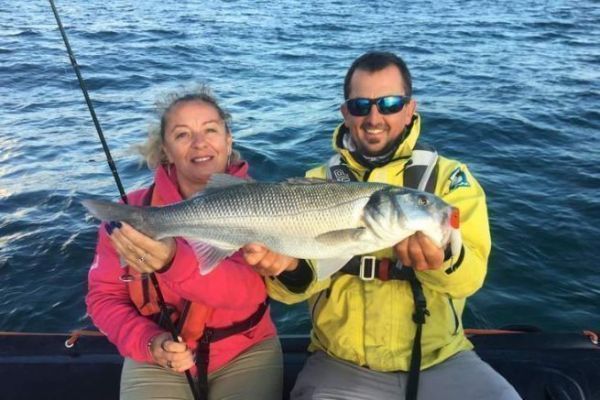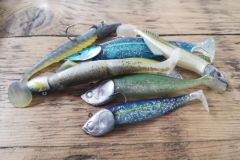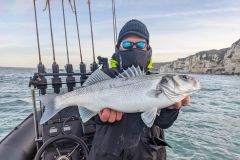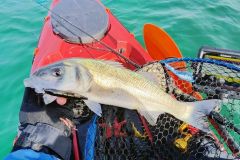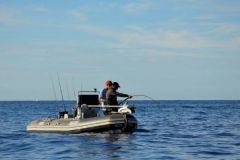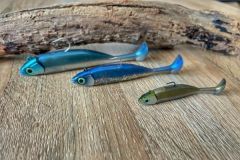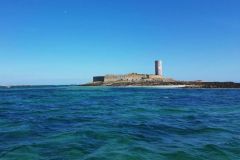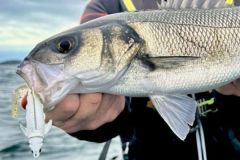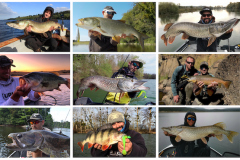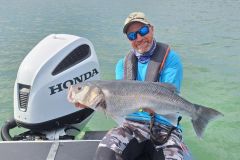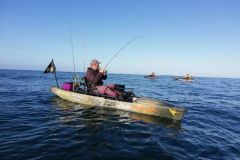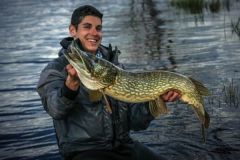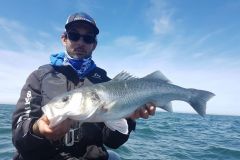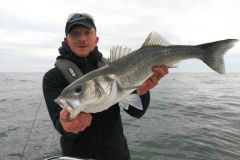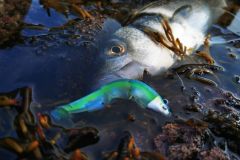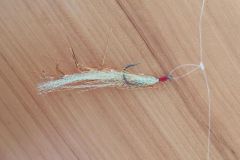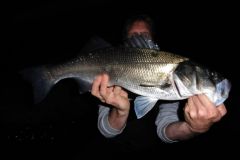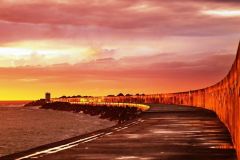Hello Sylvain, could you first introduce yourself to Pêche.com readers?
My name is Sylvain Garcia, and I live on the banks of the Rivière d'Etel in Morbihan.
I've been a professional fishing guide and skipper for 10 years now, after starting my career as an engineer in industry.
Originally from the South of France, I've been living in Brittany for over 30 years now. I've always been passionate about fishing, having been lucky enough to have a grandfather and a father who took me with them on their fishing trips from a very early age, and who thus passed on to me this passion and a particular sensitivity for natural environments, animals, birds and of course fish. Sadly, they are no longer with us, but I am infinitely grateful to them for taking the time to pass on this precious heritage to me.
I practised various types of fishing: jigging, predators and carp when I started out, then almost exclusively fly fishing (trout, predators, sea) during my teenage years. Over the last 25 years, I've done a lot of sea lure fishing (sea bass, pollack, pike, tuna - in short, anything that can be caught with a lure, especially on the surface, which for me remains the most beautiful of all techniques).
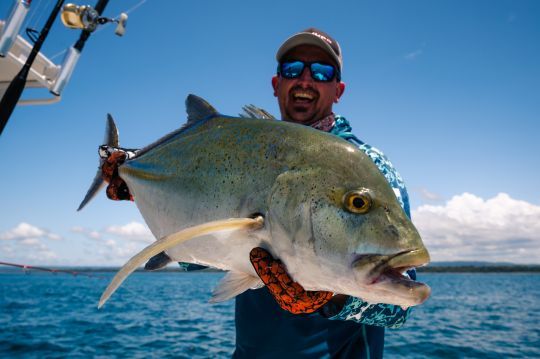
Why did you become a fishing guide?
As I said earlier, after 15 years working in the industry, I was feeling like I was going round in circles in a job whose purpose I couldn't really see any more, with ever more constraints and in deep disagreement with myself. So I wanted to give a new impetus to my career path, by passing on my passion and blossoming in a profession that now offers me incredible freedom and an exceptional working environment. So I joined the BPJEPS training course in Caulnes in 2014, and then followed this up in 2015 with a Brevet de Capitaine 200 at the Lycée Maritime in Etel, just down the road from where I live.
What kind of guidance products do you offer?
My activity is essentially based on lure fishing trips by boat, departing from the Lorient roadstead. My playground stretches from the Côte Sauvage in Quiberon, to the border of South Finistère beyond Le Pouldu, passing of course through the Ile de Groix, the Rivière d'Etel and its infamous Barre.
This vast area offers a multitude of fishing possibilities, but is relatively technical to fish, notably due to the absence of strong currents, making it difficult to locate fish and understand their movements. I mainly target sea bass, but also pollack and various species of pelagic fish, especially in summer (mackerel, Spanish mackerel, horse mackerel, bonito, etc.).
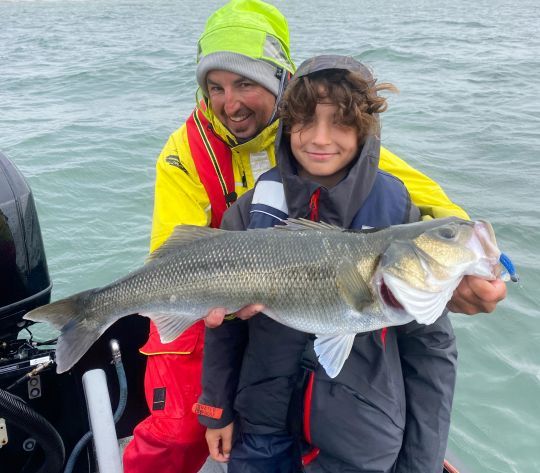
My approach is most of the time based on rather light techniques (soft lures, surface lures, spoons in particular) in relatively shallow areas (less than 10 m), which allows me to release most fish in the best conditions. In fact, I try to promote reasoned harvesting (only between 3% and 4% of bass caught are harvested, making the most of them using the Ikejime technique, and applying a catch window between 42 and 60 cm).
My maritime command certificate also enables me to offer cetacean-watching outings, of which there are many on the Morbihan coast, and to make a wider public aware of the richness, but also the fragility, of marine ecosystems.
What does being a fishing guide mean to you?
It's a vast question, and one that deserves a great deal of thought. I often repeat this to trainees at the BPJEPS course in Caulnes, where I teach every year: being a good fisherman (if you can call yourself that without being vain) doesn't make you a good fishing guide.
You need to be a good listener, a good teacher, patient and diplomatic, but also rigorous, with good business management and communication skills.
What's more, being a fishing guide isn't all about fishing and getting paid for it, as many people imagine. It's a job in its own right, with many moments of doubt, questioning and constant self-questioning. The aim is to pass on a certain amount of knowledge to your customers, and get them to catch fish by putting it into practice.
Last but not least, you have to be ready to share a lot with your customers, and therefore your best spots, which is not an easy thing to do, especially nowadays when many people want everything, right away and without effort. It's not easy to preserve your fishing area over the long term.
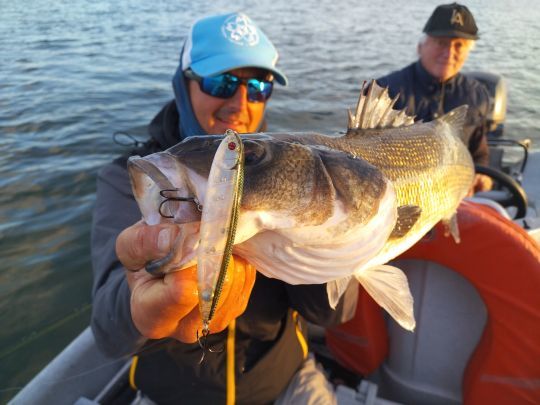
Do you fish or not when you're guiding?
This is extremely rare, because I focus all my attention and energy on my customers, listening to them, bringing them all my experience, and trying to help them catch as many fish as possible.
However, this happens in three specific cases:
- When I'm asked, because it's sometimes easier for some people to understand and assimilate a technical gesture (casting, lure animation, working the fish) by imitation rather than explanation.
- When we locate fish on the fishfinder and my customers can't get them to react despite different approaches. I then try a different animation or a different type of lure to try and find the key. And in all cases, I'll pass the rod back to my customer if I've managed to hook a fish. This also helps boost morale if the fishing proves difficult.
- When there's a lot of hunting going on and everyone's having a great time on the boat, I sometimes make a cast or two to take advantage of the frenzy!
What do you do when you're not guiding?
I try to spend as much time as possible with my family, to make up for the time I don't spend with my wife and children during the summer vacations in particular.
In winter, during the off-season, I manage all the accounting and communication, and prepare the next season with my various partners.
How do you see guiding in France?
The situation is extremely mixed, with some very good guides working in a very professional and responsible way, but also people who are not at all cut out for it, and who damage the image of the profession. What's more, unfair competition from pseudo-guides via cobaturage sites, a recurring phenomenon in many regions, doesn't make things any easier.
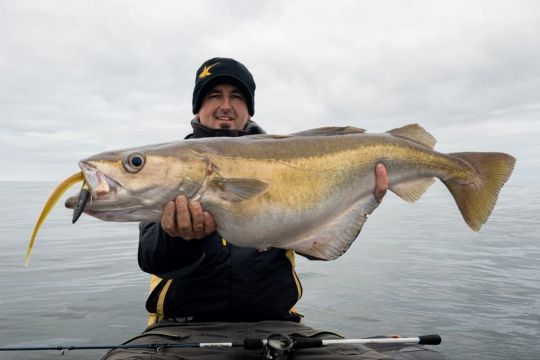
What advice would you give to people wishing to embark on this adventure?
Before taking the plunge, ask yourself the right questions about the area and the type of fishing you want to do: is there enough potential for you to work a good part of the year? Are there any fishing guides already working in the area?
Are you ready to share a lot with your customers?
Be aware that this is a highly seasonal profession, and that it's not easy to reconcile family life and professional activity (it's not easy to go on vacation with the family, for example, especially in summer). Forget bridges and public vacations for your vacations!
Finally, this is a very weather-dependent activity. You may be forced to cancel entire weeks of guiding due to the weather.
As a fisherman, what's your dream?
To be able to find the time to travel the globe in search of the countless species to be caught on surface lures!
